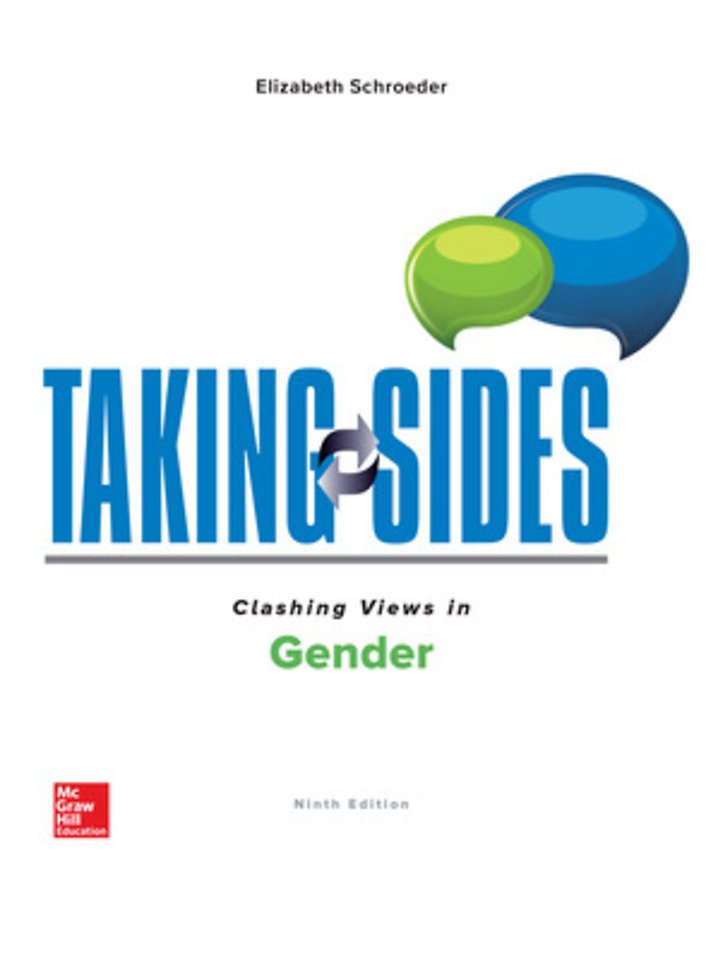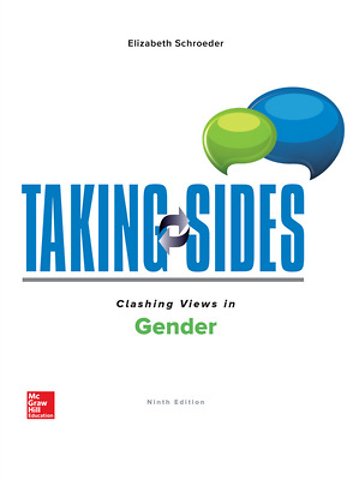Taking Sides: Clashing Views in Gender
Samenvatting
The Taking Sides Collection on McGraw-Hill Create® includes current controversial issues in a debate-style format designed to stimulate student interest and develop critical thinking skills. This Collection contains a multitude of current and classic issues to enhance and customize your course. You can browse the entire Taking Sides Collection on Create or you can search by topic, author, or keywords. Each Taking Sides issue is thoughtfully framed with Learning Outcomes, an Issue Summary, an Introduction, and an "Exploring the Issue" section featuring Critical Thinking and Reflection, Is There Common Ground?, Additional Resources, and Internet References. Go to the Taking Sides Collection on McGraw-Hill Create® at www.mcgrawhillcreate.com/takingsides and click on "Explore this Collection" to browse the entire Collection. Select individual Taking Sides issues to enhance your course, or access and select the entire Schroeder: Taking Sides: Clashing Views in Gender, 9/e book here http://create.mheducation.com/createonline/index.html#qlink=search%2Ftext%3Disbn:1260571912 for an easy, pre-built teaching resource. Visit http://create.mheducation.com for more information on other McGraw-Hill titles and special collections.
Specificaties
Inhoudsopgave
hey should have an equal say as to whether their female partner keeps or terminates a pregnancy of which they are the biological father. Writer Heather Barnett in turn argues that since the pregnant partner is the one assuming the physical risks in a pregnancy, her partner should not have any say as to whether she carries the pregnancy to term.<br/><br><br/><u>Issue: Are Children Who Are Raised by a Lesbian or Gay Couple Worse Off than Those Raised by Different-sex Parents?</u><br/>YES: Mark Regnerus, from "Media Gush over New Study, Only to Find Same-sex Parents More Irritated with Their Children," Public Discourse (2016)<br/>NO: Henny M. W. Bos et al., from "Same-sex and Different-sex Parent Households and Child Health Outcomes: Findings from the National Survey of Children’s Health," Journal of Developmental & Behavioral Pediatrics (2016)<br/><br><br/>Researcher Mark Regnerus questions the validity of how data were examined and discussed in a recent study that suggested children do better with same-sex parents or caregivers than different-sex ones, asserting biased analysis and conclusions. Researcher Henry Bos and his colleagues, authors of the study, maintain that the children of lesbian parents demonstrate no differences in general health, emotional difficulties, coping behaviors, and learning capacities from children with different-sex parents.<br/><br><br/><u>Issue: Should a Pregnant Woman Be Punished for Exposing Her Fetus to Risk?</u><br/>YES: Liles Burke, from Hope Elisabeth Ankrom v. State of Alabama, Circuit Court of Coffee County (2011)<br/>NO: Lynn M. Paltrow, from "Punishment and Prejudice: Judging Drug-Using Pregnant Women," Mother Troubles: Rethinking Contemporary Maternal Dilemmas (1999)<br/><br><br/>Liles Burke sets out the majority opinion of the Alabama Court of Criminal Appeals in a case involving a pregnant woman who was found to have used cocaine while pregnant. Burke argues that Alabama law that forbids adults from exposing children to controlled substances applies in cases involving pregnant women and their fetuses. Attorney Lynn M. Paltrow argues that treating drug-using pregnant women as criminals targets poor, African American women while ignoring other drug usage and fails to provide the resources to assist them in recovery.<br/><br><br/><u>Issue: Should Transgender Children Be Allowed to Transition?</u><br/>YES: Samantha Allen, from “It’s Absurd to Claim That Trans Kids Are Being ‘Rushed’ Into Transitioning,” The Daily Beast (2017)<br/>NO: Michelle Cretella, from "Gender Dysphoria in Children," American College of Pediatricians (2018)<br/><br><br/>Daily Beast Senior Reporter Samantha Allen interviews youth development experts whose research has found that allowing transgender children to transition can save their lives. Dr. Michelle Cretella, president of the American College of Pediatricians, asserts that children are cognitively incapable of providing consent, and that starting medical transition so early in their lives amounts to mass sterilization of youth.<br/><br><br/>Unit 4: Gender in the World around Us<br/><br><br/><u>Issue: Should Public Restrooms Be Gender-Neutral?</u><br/>YES: Nico Lang, from “Why All Public Bathrooms Should Be Gender Neutral," The Daily Beast (2016)<br/>NO: Elizabeth Lee Vliet, from "Doc: ’Gender Neutral' Bathrooms are Dangerous," WND (2016)<br/><br><br/>Writer Nico Lang cites violence and safety risks as the reasons for gender-neutral rest rooms, providing examples of people who are not read as a particular gender being assaulted by someone thinking they were using the “wrong” restroom. Dr. Elizabeth Vliet hones in on her concerns for the safety of cisgender girls and women, asserting that someone assigned male at birth, even if they identify as anything other than male, is still ruled by testosterone, and therefore the risk of indecent exposure and/or sexual assault remains.<br/><br><br/><u>Issue: Is Gender Identity Biological?</u><br/>YES: Aruna Saraswat, Jamie D. Weinand, and Joshua D. Safer, from “Evidence Supporting the Biological Nature of Gender Identity,” Endocrine Practice (2015)<br/>NO: Michael J. Carter, from “Gender Socialization and Identity Theory,” Social Sciences (2014)<br/><br><br/>Saraswat, Weinand, and Safer review empirical studies that suggest gender as biologically caused. They discuss congenital adrenal hyperplasia (CAH), gray and white matter studies, and twin case studies as evidence for their argument is that gender has a biological basis. Michael J. Carter explores a review of the literature that emphasizes gender identity as being based in learned roles. He discusses how gender is learned over time in the family environment and how gender can be a person identity, role identity, or social identity in gender identity theory. He argues that gender comes from learned roles in society.<br/><br><br/><u>Issue: Should Only Transgender Actors Be Allowed to Play Transgender Characters?</u><br/>YES: Phaylen Fairchild, from "The Ongoing Problem With Trans Representation in Media," Medium (2018)<br/>NO: Alexandra DeSanctis, from "The Transgender Community’s Ridiculous Crusade against Acting" National Review (2016)<br/><br><br/>Transgender writer and actor Phaylen Fairchild argues that having cisgender actors play transgender characters contributes to the alienation of transgender individuals in society by removing their visibility from the general public. National Review journalist Alexandra DeSanctis argues that the whole point of acting is for someone to present a character they are not, and that an actor does not necessarily need to identify as transgender to be able to provide an effective portrayal of that character.<br/><br><br/><u>Issue: Can a Woman with Conservative Political Views Be a Feminist?</u><br/>YES: Eric C. Miller, from "How Conservative Christian Women Came to Claim ‘True’ Feminism," Religion Dispatches (2014)<br/>NO: Amanda Marcotte, from "Stop Trying to Make Conservative Feminism Happen," Rewire (2015)<br/><br><br/>Eric Miller interview author Leslie Dorrough Smith whose book, “Righteous Rhetoric: Sex, Speech, and the Politics of Concerned Women for America” outlines the CWA’s arguments of why the Conservative definition of feminism is true feminism. Amanda Marcotte believes that being pro-choice is a requirement for one being able to call oneself a feminist, and so if social Conservatives are all antichoice, by definition they cannot be feminists.<br/><br><br/><u>Issue: Are There “Male” and “Female” Brains?</u><br/>YES: Gregory L. Jantz, from "Brain Differences Between Genders," Psychology Today (2014)<br/>NO: Lila MacLellan, from “The Biggest Myth about Our Brains Is That They Are ‘Male’ or ‘Female,’” Quartz (2017)<br/><br><br/>Author Gregory L. Jantz describes research demonstrating there are approximately 100 gender differences in the brain, and that these differences should be used to inform how adults parent, educate, and support children from their youngest ages. Quartz reporter Lila MacLellan focuses on research relating to neuroplasticity, or the ability for the brain to change during life. She argues that, even if there are certain neuro differences in brains based on sex, these are not set in stone and therefore should not determine how we interact with our same or another gender.<br/><br><br/><u>Issue: Should Women Be Ordained as Catholic Priests?</u><br/>YES: Sarah Macdonald, from "Pure Codology: The Case for Women Priests," The Independent (2018)<br/>NO: Fr. Dwight Longenecker, from “Why Women Can’t Be Catholic Priests,” www.dwightlongnecker.com (2018)<br/><br><br/>Irish Times journalist Sarah Macdonald describes extensive support from women in various non-Catholic Christian traditions, some of which have already ordained women as leaders as rationale for the Catholic church to do the same. Catholic priest Father Dwight Longenecker argues that, in addition to millennia of writing to support this, Jesus being a man has pre-ordained that only men can be priests.<br/><br><br/><u>Issue: Should Children's Toys Be Gender-Neutral?</u><br/>YES: Amy Dempsey, from “Why Toys are More Divided by Gender Than Ever Before,” The Star (2017)<br/>NO: James Delingpole, from “Why It's Not Sexist to Say Boys Should Never Play with Dolls,” Daily Express (2014)<br/><br><br/>Amy Dempsey posits, by citing children’s toy manufacturers and psychologists, that gendering and marketing particular toys to specific genders reinforces social stereotypes and limits children in their options for how they engage in the world. Children are taught to want to play with particular toys based on their sex or gender, it is not predetermined by biology. James Delingpole argues that even if toys were to be gender neutral, a child’s chromosomal composition would cause that child to behave according to their sex assigned at birth. Having gender-neutral toys is, therefore, unnecessary, since children will still naturally gravitate toward toys that their chromosomal composition dictates are for them.<br/><br><br/><u>Issue: Should the United States Ratify the Convention to Eliminate All Forms of Discrimination Against Women?</u><br/>YES: Melanne Verveer, from "Ratify the CEDAW," U.S. Senate (2010)<br/>NO: Steven Groves, from "Reject CEDAW," U.S. Senate (2010)<br/><br><br/>Melanne Verveer, ambassador-at-large, Office of Global Women’s Issues, U.S. Department of State, tells a congressional committee that the U.S. Senate should ratify the Convention on the Elimination of All Forms of Discrimination Against Women (CEDAW) beca
use doing so would send a powerful message about the U.S commitment to equality for women across the globe. Steven Groves, the Bernard and Barbara Lomas Fellow in the Margaret Thatcher Center for Freedom, a division of the Kathryn and Shelby Cullom Davis Institute for International Studies at the Heritage Foundation, headquartered in Washington, DC, contends that ratifying CEDAW would neither advance U.S. international interests nor enhance the rights of women in the United States.<br/><br><br/>

